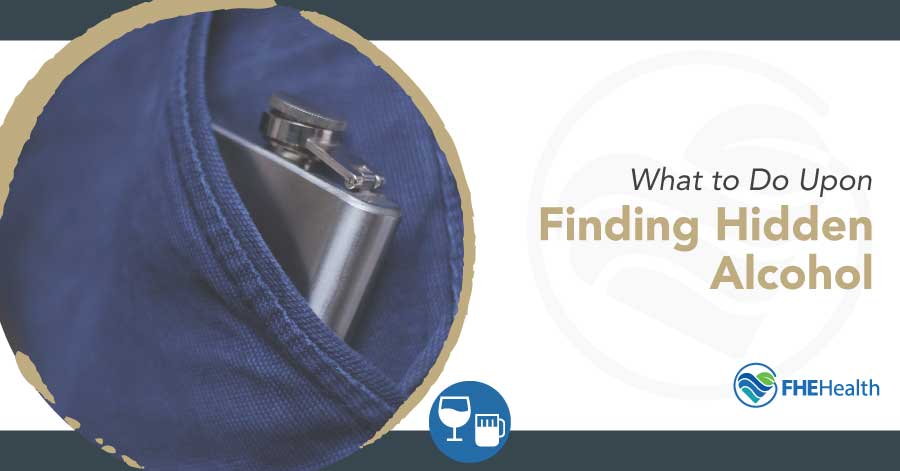
Finding out your loved one has been hiding their use of alcohol is a serious matter. This can be shocking for you because there’s a chance you didn’t have any idea there was a problem. It’s easy to react out of shock and anger when you find they’re hiding alcohol around the house.
There are several ways you might realize your loved one is hiding their drinking problem. You may find a flask or alcohol bottle hidden. You may start to see signs of alcohol use or addiction. Once you find hidden alcohol or realize your loved one is secretly drinking alcohol, you have to take action.
What Are the Signs of Alcohol Use Disorder?
Around 14.5 million Americans who are at least 12 years old suffer from alcohol use disorder. You may not think your loved one would ever be in that group. However, when your significant other hides alcohol around the house or starts sneaking alcohol into drinks, there’s a problem. Some individuals may exhibit the following signs:
- Smell of alcohol on their clothing, breath or body
- Lax personal grooming habits
- Bloodshot eyes
- Hiding alcohol or drinking
- Weight loss or gain that can’t be explained
- Impaired coordination
- Slurred speech
- Relationship difficulties
- Getting into fights or legal trouble
- Financial problems
- Avoiding events that don’t include alcohol
- Paranoia or anxiety
- Mood swings
- Irritability
Why Is Excessive Alcohol Use Dangerous?
Excessive alcohol use causes around 95,000 deaths each year in this country. Around 1 out of every 10 deaths of people 20 to 64 years old can be attributed to excessive drinking. If your wife or husband is hiding drinking, there’s a chance they’re drinking enough to become part of those statistics.
Alcohol use negatively impacts the way the body functions. It can cause problems with the liver. It also increases the risk of certain cancers, stomach bleeding, depression, heart disease, stroke and other medical conditions. There are also risks of injuries stemming from drunk driving crashes, falls and violence.
Relationships can crumble when one person is abusing alcohol. Trusting is hard when you find out that your husband or wife is hiding drinking. Even if the person is willing to get help, it might be hard for the relationship to recover.
Why Would Someone Hide Alcohol?
Alcohol use is common for many people. While it’s possible someone will be able to drink without it causing any issues, there are other times it becomes a serious problem. Some people may try to hide their dependency on alcohol from their family members and friends.
People may worry that their loved ones will get upset about their drinking. They may be ashamed about how much they’re drinking. Once they become addicted to alcohol, it might be impossible for them to stop on their own. When anyone, including a husband, hides drinking, it could be a silent cry for help. It’s important to realize that they may not know how to talk to you about getting the help they need.
Why Is Alcoholism Becoming More Prevalent?
With more people working remotely, there’s an increased chance of someone being able to hide their dependency on alcohol since they won’t be around people at work as much. This gives them the chance to drink without being seen. It could also mean nobody notices the signs of them being impaired.
Adults sometimes use alcohol as a coping mechanism. They may drink alcohol to drown their feelings and emotions. This is often the case when there are negative things going on around them. It might even be a way they can feel more upbeat; however, the joyous effects of alcohol are short-lived because they’ll likely have a hangover the next day.
Some people are turning to alcohol as a way to cope with the loneliness of the pandemic. It’s possible that they’re going days at a time without human interaction. This could lead to them using alcohol as a way to overcome that loneliness.
How Can You Help Someone When You Find Out They’re Hiding Alcohol?
While you might be angry when you find out your loved one is hiding alcohol, you can’t react to that anger. Instead, your focus should be on getting them the help they need. You have every right to be concerned. Let your concern take the helm while you show compassionate support for them.
One thing you should do is dispose of the hidden alcohol, not only because of the addiction but also because of the safety risk. Hiding alcohol around the house could mean that children have access to it. Discuss the safety impact of hiding alcohol when you talk to them because this might help them see they’re facing a serious problem.
Don’t judge your loved one when you discuss them hiding alcohol. Simply state what you’ve seen and what concerns you have. Work with them to come up with a plan to address the issue. This should include them getting help for the alcoholism. Talk to them about how you’ll offer support. Going on this journey with the support of loved ones greatly improves the chances they’ll achieve and maintain sobriety.
It might be a good idea for you to find out about a treatment program before you bring the subject up. The counselors at FHE Health can let you know what to expect with our program so you can let your loved ones know when you talk to them. The important thing is that they’re ready to embark on the sobriety journey so they’ll give the program their best effort.
Contact FHE Health
Finding help for your loved one after you find hidden alcohol is important. Contact the professionals with FHE Health at (833) 596-3502 to discuss the situation with us. Our counselors are ready to help your loved one get started on a journey to sobriety today.






